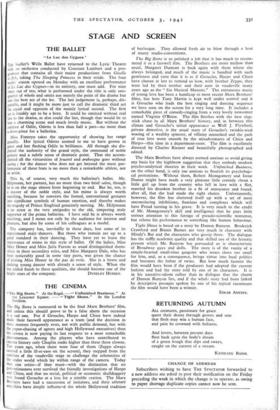_ THE CINEMA
"The Big Store." At the Regal.—" Unfinished Business." At the Leicester Square. — Tight Shoes." At the London Pavilion.
The Big Store is rumoured to be the final Marx Brothers' film, and unless this should prove to be a false alarm the occasion is a sad one. For if Groucho, Harpo and Chico have indeed made their farewell appearance as a team (and the decision in these matters frequently rests, not with public demand, but with the paper-chasing of agents and high Hollywood executives) then the screen is now paying its last respects to a most remarkable phenomenon. Among the players who have contributed to cinema history only Chaplin ranks higher than these three clowns. Ten years ago, when there were four of them (Zeppo always seemed a little ill-at-ease on the screen), they stepped from the confines of the vaudeville stage to challenge the solemnities of the wider world which lay within range of the" camera. Today they can retire—if they must—with the distinction that no pretentiousness ever survived the friendly investigations of Harpo and Chico, and that no social, political or economic skullduggery ever found Grouch() at a loss for a nimble oration. The Marx Brothers have had a succession of imitators, and their salutary anarchies have deeply influenced the whole Hollywood tradition
of burlesque. They allowed fresh air to blow through a host of musty studio-conventions.
The Big Store is so polished a job that it has much to recom- mend it as a farewell film. The Brothers are more mellow than usual, Margaret Dumont is back again with them where she always belonged, and much of the music is handled with such gentleness and taste that it is as if Groucho, Harpo and Chico have chosen at last to remind us how, with brother Zeppo, they were led by their mother and their aunt in vaudeville many years ago as the " Six Musical Mascots." The extraneous music of young love has been a handicap to most recent Marx Brothers' films, but here Tony Martin is kept well under control and it is Groucho who leads the best singing and dancing sequence we have seen on the screen for a very long time. It includes a remarkable piece of comedy-singing from a very lovely newcomer named Virginia O'Brien. The film finishes with the best slap- stick chase in all Marx Brothers' history, and in between this climax and Groucho's initial appearance as Wolf J. Flywheel, private detective, is the usual story of Groucho's twinkle-toed wooing of a wealthy spinster, of villainy unmasked and the path of true love worn smooth by the misadventures of Chico and Harpo—this time in a department-store. The film is excellently directed by Charles Riesner and beautifully photographed and edited.
The Marx Brothers have always seemed anxious to avoid giving any basis for the highbrow suggestion that they embody modern psycho-analytical theories in their work. Unfinished Business, on the other hand, is only too anxious to flourish its psychologi- cal pretentions. Without them, Robert Montgomery and Irene Dunne might have made a very pleasant little comedy ?bout a little girl up from the country who fell in love with a flirt, married his drunken brother in a fit of annoyance and found, after all, that she had made the right choice. Unfortunately, however, the film has cluttered itself up with a set of most unconvincing inhibitions, fixations and complexes which will have Freud turning in his grave. It is very much to the credit of Mr. Montgomery's skill and intelligence that he pays little serious attention to this farrago of pseudo-scientific nonsense, but relates his performance to something like human behaviour.
Tight Shoes is based on a story by Damon Runyon. Broderick Crawford and Binnie Barnes are very much in character with Mindy's Bar and the characters who gossip there. The dialogue has the stiffly academic quality and that skilled use of the historic present which Mr. Runyon has persuaded us is characteristic of Broadway guys and dolls. The story is of the vanity of a simple-hearted small-time gangster who wears shoes too small for him, and, as a consequence, brings virtue into local politics and becomes the father of twins. But how much funnier the film would have been if the producers had adopted the current fashion and had the story told by one of its characters. It is in his narrative-idiom rather than in dialogue that the charm of Damon Runyon lies, and if the whole story had been linked by descriptive passages spoken by one of his typical raconteurs the film would have been a winner.
EDGAR ANSTEY.


























 Previous page
Previous page